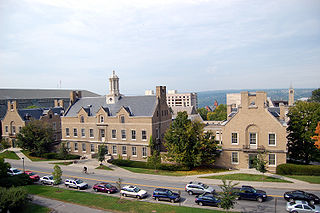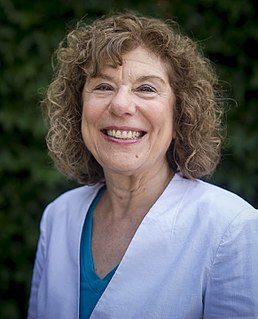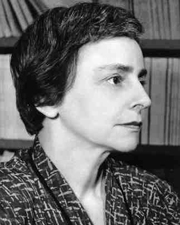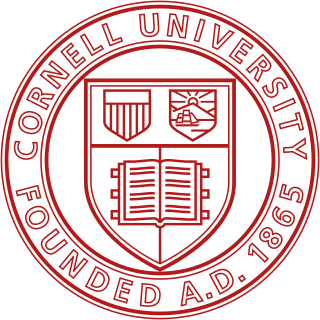
Alice Walker is an American novelist, short story writer, poet, and activist. She wrote the novel The Color Purple (1982), for which she won the National Book Award for hardcover fiction, and the Pulitzer Prize for Fiction. She also wrote the novels Meridian (1976) and The Third Life of Grange Copeland (1970), among other works. An avowed feminist, Walker coined the term "womanist" to mean "A black feminist or feminist of color" in 1983.
Anne Carson is a Canadian poet, essayist, translator, and professor of Classics. Carson lived in Montreal for several years and taught at McGill University, the University of Michigan, and at Princeton University from 1980 to 1987. She was a 1998 Guggenheim Fellow, and in 2000 she was awarded a MacArthur Fellowship. She has also won a Lannan Literary Award.

The New York State School of Industrial and Labor Relations at Cornell University (ILR) is an industrial relations school at Cornell University, located in Ithaca, New York, United States. The School has six academic departments which include: Economics, Human Resource Management, International and Comparative Labor, Labor Relations, Organizational Behavior; and Social Statistics.

Elizabeth Alice Austen was a Staten Island photographer.

Jacob Gould Schurman was a Canadian-born educator and diplomat, who served as President of Cornell University and United States Ambassador to Germany.

Alice Hamilton was an American physician, research scientist, and author who is best known as a leading expert in the field of occupational health and a pioneer in the field of industrial toxicology. She was also the first woman appointed to the faculty of Harvard University. Her scientific research focused on the study of occupational illnesses and the dangerous effects of industrial metals and chemical compounds. In addition to her scientific work, Hamilton was a social-welfare reformer, humanitarian, peace activist, and a resident-volunteer at Hull House in Chicago. She was the recipient of numerous honors and awards, most notably the Lasker Award for her public-service contributions.
John Henrik Clarke, was an American historian, professor, and a pioneer in the creation of Pan-African and Africana studies, and professional institutions in academia starting in the late 1960s.
Staughton Craig Lynd is an American conscientious objector, Quaker, peace activist and civil rights activist, tax resister, historian, professor, author and lawyer. His involvement in social justice causes has brought him into contact with some of the nation's most influential activists, including Howard Zinn, Tom Hayden and Daniel Berrigan.

The history of Cornell University begins when its two founders, Andrew Dickson White of Syracuse and Ezra Cornell of Ithaca, met in the New York State Senate in January 1864. Together, they established Cornell University in Ithaca, New York, in 1865. The university was initially funded by Ezra Cornell's $400,000 endowment and by New York's 989,920-acre (4,006.1 km2) allotment of the Morrill Land Grant Act of 1862.

Ruth Milkman is an American sociologist of labor, Distinguished Professor of Sociology at the Graduate Center, CUNY and academic director of the Joseph F. Murphy Institute for Worker Education and Labor Studies.
Walter Galenson was a professor of economics at Cornell University and a noted U.S. labor historian and economist.
Barbara Rose Bergmann was an important feminist economist. Her work covers many topics from childcare and gender issues to poverty and Social Security. Bergmann was a co-founder and President of the International Association for Feminist Economics, a trustee of the Economists for Peace and Security, and Professor Emerita of Economics at the University of Maryland and American University.
Theresa Wolfson (1897–1972) was an American labor economist and educator. Wolfson is best remembered as the education director of the International Ladies' Garment Workers' Union during the second half of the 1920s and as a leader of the workers education movement during the 1930s.

Francine Dee Blau is an American economist and professor of economics as well as Industrial and Labor Relations at Cornell University. In 2010, Blau was the first woman to receive the IZA Prize in Labor Economics for her "seminal contributions to the economic analysis of labor market inequality." She was awarded the 2017 Jacob Mincer Award by the Society of Labor Economists in recognition of lifetime of contributions to the field of labor economics.
Barbara Mayer Wertheimer was an American historian and labor organizer. Her research specialized in United States labor and gender history.

Alice Domurat Dreger is a historian, bioethicist, author, and former professor of clinical medical humanities and bioethics at the Feinberg School of Medicine, Northwestern University in Chicago, Illinois.

Tobe Levin Freifrau von Gleichen, a multi-lingual scholar, translator, editor and activist, is an Associate of the Hutchins Center for African and African American Research at Harvard University; a Visiting Research Fellow at the International Gender Studies Centre, Lady Margaret Hall, University of Oxford; an activist against female genital mutilation (FGM) and professor of English Emerita at the University of Maryland, University College. Having received her PhD in 1979 from Cornell University, she is most known for combining her advocacy against FGM with her academic scholarship in comparative literature. She has published peer-reviewed and popular articles and book chapters, edited four books, launched UnCUT/VOICES Press in 2009 and founded Feminist Europa Review of Books (1998-2010). Her most notable works to date are Empathy and Rage. Female Genital Mutilation in African Literature and Waging Empathy. Alice Walker, Possessing the Secret of Joy, and the Global Movement to Ban FGM. Alice Walker expressed appreciation for the text that shows worldwide solidarity with the novelist's literary abolition efforts in the early nineties. Levin has also teamed up with Maria Kiminta and photographer Britta Radike to publish a memoir and sourcebook, Kiminta. A Maasai's Fight against Female Genital Mutilation.

Marie Syrkin was an American author, translator, educator, and Zionist activist.
Alice Brown is a Scottish academic who is Emeritus Professor of Politics at the University of Edinburgh. She was on the consultative steering group that advised on procedural aspects when the new Scottish Parliament was being set up. Her work included promoting the equal representation of women. She was the first Scottish Public Services Ombudsman, serving for two terms between 2002 and 2009, and was a member of the Administrative Justice and Tribunals Council 2008–2012. She was a member of the Committee on Standards in Public Life 1998–2003 and was elected as the first female General Secretary of the Royal Society of Edinburgh (RSE) 2011–2013. She has been chair of the Scottish Funding Council since 2013.













